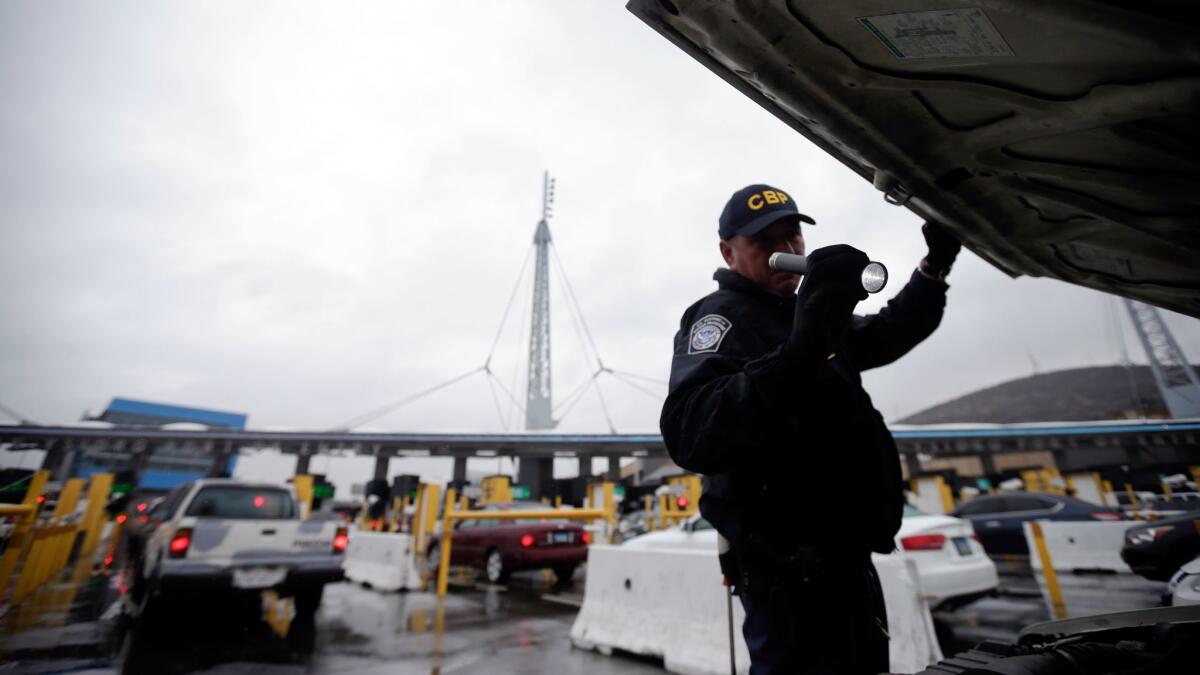Editorial: Restore the 4th amendment at the U.S. border

- Share via
In a recent op-ed for the Los Angeles Times, naturalized U.S. citizen Lubana Adi detailed how Customs and Border Protection agents seized and searched her phone without a warrant when she returned from visiting family in Turkey. “Does the 4th Amendment apply to Muslim citizens at LAX?” she asked.
The sad truth is that its core protections don’t seem to apply to any U.S. citizen at the border, where customs agents are as free to pore through hard drives as they are to scrutinize roller bags and backpacks. This so-called border exception to the 4th Amendment has a long history. The very first Congress called for warrantless searches at the border to ensure the proper collection of duties; since then, the rationalization expanded to include the need to block contraband, such as illegal drugs and child pornography.
With laptops and smartphones proliferating, though, border agents are using the exception to seek something other than smuggled goods or contraband — they’re looking for evidence that the device’s owner is up to no good. Such searches multiplied in the last two years of the Obama administration, rising from 4,700 in 2015 to almost 24,000 in 2016, the Associated Press reported. The Trump administration has multiplied them again, with searches on pace to hit 60,000 this year.
Searches conducted without even a reasonable suspicion of unlawful activity aren’t just inefficient; they’re also an affront to Americans’ constitutional right to privacy. Adi and her fellow citizens are having the sensitive personal information on their digital devices hoovered up by federal agents — apparently because of where they traveled or their ethnicity, other times purportedly because of randomly applied scrutiny. Some even are having their devices searched before they leave.
Smartphones and laptops aren’t like luggage — they are repositories of medical and financial data, communications with loved ones, and in many cases a detailed digital history of one’s movements. The breadth and sensitivity of that information is what makes these devices different from the sorts of personal possessions that law enforcement officers can legally examine without a warrant, a unanimous Supreme Court ruled three years ago. That ruling applied to people whom police officers have arrested, which invites the question why Americans at the border should have fewer rights than those in a holding cell.
Sens. Ron Wyden (D-Ore.), Rand Paul (R-Ky.) and a bipartisan group of House members think the answer is: “They shouldn’t.” They’ve introduced legislation in the House and Senate to bar border agents from searching a U.S. citizen’s or lawful permanent resident’s digital devices without a warrant. It also would prohibit an increasingly common tactic of delaying or refusing entry to citizens and lawful residents unless they “volunteered” their device passwords and social media accounts.
The measure would allow warrantless searches for emergency situations involving imminent threats, national security or organized crime, as long as there are grounds to obtain a warrant after the fact. It’s a reasonable exception that underlines the point of the bill, which is to stop baseless searches of U.S. citizens — a step that’s long overdue.
Follow the Opinion section on Twitter @latimesopinion and Facebook.
More to Read
A cure for the common opinion
Get thought-provoking perspectives with our weekly newsletter.
You may occasionally receive promotional content from the Los Angeles Times.









